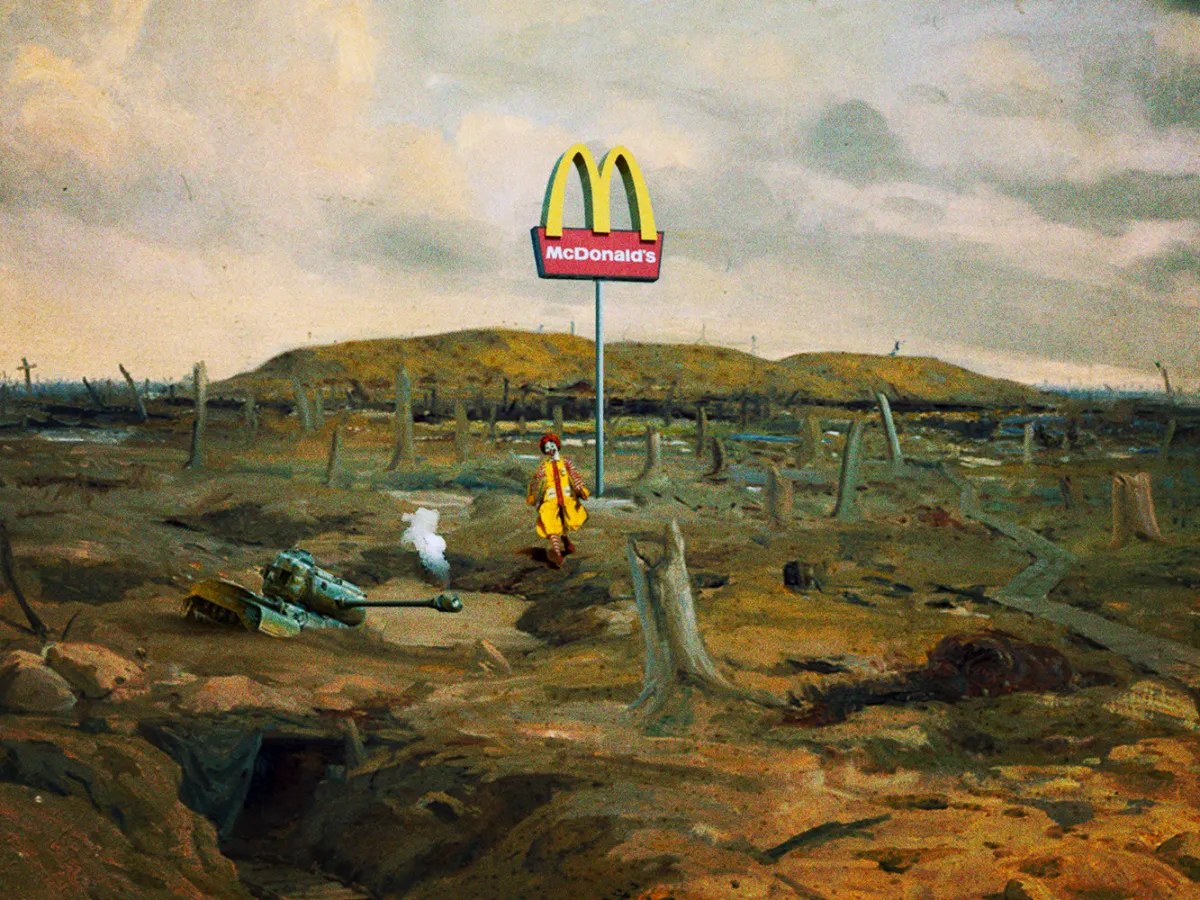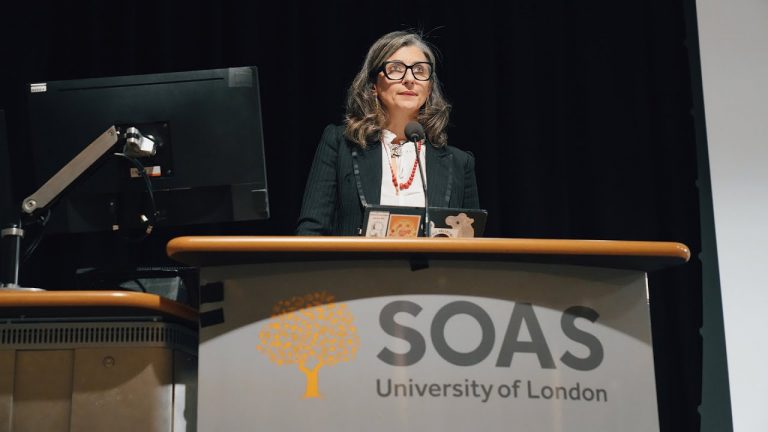By Ismail Abdi, Economy & Development Editor
‘Rational Economics’ in a Dystopian World?
Is there anything rational about our economics as the world around us becomes more and more dystopian?

Today the terms “rational” and “economics” are becoming increasingly harder to combine. Those (read “countries”) who have effervescently and most disturbingly propagated its benefits and its magic, have now openly turned their backs on it. We now have a dog-eat-dog world in which the most powerful nation which forcefully established itself as the sun in our economical solar system—as a matter of security in fact[1]—is shaking down the rest of the world. Piggy bank breaking, coin jar smashing, Soprano’s style and all.[2] Somehow a century of playing the game by its established rules, following the diktat set out by its own economic policy hubs—the World Bank, IMF, the Fed, its several many universities and academic which dominate the intellectual discourse, all before getting on to the unchallenged use of the dollar as a trade and reserve currency—is not enough as far as servitude goes. Nay, it’s the “trade deficits”[3] of a fundamentally consumptive (I mean Jesus, you try watching an American football game, with its 10 minutes of commercials for every minute of play), service-based economy which are to blame for its malaise.[4] Indeed, by all accounts the implications for the US and its consumer-base—if we can separate the two that is—are projected to be far worse.[5] The whole debacle since his re-ascension has proven the summit of a long-standing shift towards dystopia, in which the US is only part of the problem.[6] The point of this piece, however, is not an elaborate discourse on Trump—that’s become a whole genre, which I’m sure the man himself is chuffed to see. Rather it’s a shallow dive into the concept of ‘rationality’ as regards economics, how it has evolved over the course of its history, and how current events challenge its legitimacy going forward.
Without refutation, multilateralism now sits at an absolute low point. Once virile institutions, like the WTO, WHO, the UN and its collection of sub-institutions, are a shadow of what they were 10-15 years ago. This is before we get onto the apparent neglect of consensus-based regimes like climate change, and above all the shocking disregard for human life as embodied in Gaza. The rupture of the order which has defined the last 80 years, has profound if not corporeal implications for Economics as a discipline going forward. As a discipline it has been inseparable from the evolution of exchange relations, which in turn followed the track of globalisation. You do not have economics as you do today—both ‘mainstream’ and ‘heterodox’—without the transition from feudalism to early industrialism, to the dynamic capitalism of the previous century, and the hyper-globalised model we have today.[7],[8] In the same way the field itself started off as a sociological observation of power relations with a particular focus on surpluses and value—and only later picked up the charts, calculus, and complex modelling we have today.[9]
Early ‘political economy’ broached the underpinnings of exchange relations and the concept of value as embedded within it. In particular it highlighted those actors considered “productive”.[10] This in itself brought about an inherent societal challenge, as those quite literally considered divine (the monarchs, nobles, and clerics) were deemed wholly unproductive by the earliest thinkers Francois Quesnay and less so Adam Smith.[11] In brute terms, they were considered leeches who simply consumed society’s surplus, whilst farmers on the other hand were termed most productive and the base upon which society rests. Quickly this perception would change, and more and more different actors would be included in the productive pyramid, from artisans to capitalists, as newer forms of ‘applied labour’ were deemed to add value by groundbreaking (political) economists.[12] What was yesterday rationalised into the mainstream by one theorist was tomorrow deconstructed by the next new theorist building on and finding the holes in their analysis. Alongside and at times driven by these discoveries, we would have all the societal changes which have shaped our present world from the expansion of suffrage to labour movements, and so on. As it moved along political economy now “Economics”, crystallised its core discoveries and theories as factual and with a healthy application of mathematics positioned itself in the mainstream as more of a natural science.[13]
The essential point in elaborating on economic history (or the history of economics) is that the idea of “rational” in context, was forward moving and in line with ever evolving socio-economic relations. What appears today however is by all accounts a regression which is only dragging down the legitimacy of economics as a serious subject along with it.
That the US is taking such a stand is particularly important because the global economy as we know it is inseparable from the standing hegemon (Pax Britannica then Pax Americana now). But it’s important to note that this is a wider phenomenon and that the US is not solely to blame, not today nor yesterday. The EU, China, Russia, BRICS, etc., few can be absolved of blame. In a sense once can understand the point, or rather, the place from which this all derives: extractive systems have since the dawn of time been the most cost-effective and favoured method of accumulation, even if less profitable in the long term.[14] Equally, the supposedly ‘inclusive’ institutions arguably could not have been established without a bedrock of extraction elsewhere—the Spanish and Portuguese conquests of South America, the (Trans-Atlantic) Slave Trade, the Spice Trade in Asia, the British Raj, the Opium wars, the colonisation of the Middle East after WWI, among many examples. Of course, one can point towards epochs, such as the oft cited ‘golden era’ of the 1950s and 60s, in which systems of apparently equitable or at least balanced distribution in which merit is the primary determinant of one’s prosperity, prevailed. Even here however, a critical account would show that structural imbalances meant that the prosperity for some came at the expense of others.[15] Given this then, one might paradoxically argue that given the power shifts in world politics, what we are observing today is indeed a “rational” turn. The question remains, however, as to whether it is “evolutionary”. The risk for ‘Economics’ with a capital E, then, is that it thus fails to assert itself uniquely over Politics, not just in practice but as a study. For if centuries of legitimised knowledge can simply be swept aside by the most powerful actor and longtime promoter, well then what have you. The discoveries and laws of the natural sciences, once legitimised, cannot be flatly rejected in the same way that one apparently can for economics—although perhaps, the response to climate change gives evidence to the contrary.
This all begs the question of a return to primacy for ‘Political Economy’ not just as an awkward subtopic which straddles both, offered as a minor or an optional module as part of an undergraduate degree, but the overarching study which both fall under. This is not an argument to take the maths out of Economics or to alleviate ourselves of all the practical advancements made over the centuries. Rather it’s a call to understand that it is indeed a social science, in which there is no definitively ‘right’ or ‘wrong’ answer, but a best constructed thesis.

Bibliography
[1] See the ‘Carter Doctrine’ https://history.state.gov/historicaldocuments/frus1977-80v18/d45
[2] “How to win at foreign policy” The Economist (2025) Aug 16 ed.
[3] “The U.S. Trade Deficit: How Much Does It Matter?” CFR (2025) https://www.cfr.org/backgrounder/us-trade-deficit-how-much-does-it-matter#chapter-title-0-6
[4] See “The challenge of using excess global savings” and “Why global imbalances do matter” Martin Wolf
[5] Arsenal Football Club have recently announced a tariff cover on US deliveries as levies have ballooned the price of orders.
[6] On the broader economics front see “The world was going transactional long before Trump” by John Plender for a discussion (FT, 2025). On the WTO and the US-China Trade War, see “The downfall of the World Trade Organization” by Mathias Döpfner for a critical take on China (Politico, 2025). For the EU’s role in this particular matter, despite it feigning benevolence, see (Hopewell 2015) and (Youngs 2010). Alongside all of this, the innumerous small and middle players who have by force or otherwise played their part in a myriad of scandals, violations, and crises which have scarred the world wideover.
[7] “What is the current state of capitalism? Insights from SOAS academics” Matteo Giordano (2024) https://www.soas.ac.uk/about/blogs/what-current-state-capitalism-insights-soas-academics
[8] In a personal discussion with a renowned economics professor, they admitted that we are “still living in the aftermath (of the Global Financial Crisis)”
[9] “The Use of Knowledge in Society” Friedrich A. Hayek (1945)
[10] “The Value of Everything” Mariana Mazzucato (2017)
[11] “Smith, Ricardo, Marx” Claudio Napoleoni (1977)
[12] “The Worldly Philosophers” Robert Heilbronner (2000)
[13] “Inflation and Unemployment” Milton Friedman (1977)
[14] “Why Nations Fail” Daron Acemoğlu and James A. Robinson (2012)
[15] For the golden period coincided with the latter days of colonialism, and the periods of early independence, in which access to vital raw materials was still of ease. As soon as challenges began on this front, the Oil crisis of the early 1970s, the Third World Movement and the New International Economic Order (NIEO) the scene rapidly. See “The Use of Public Power” by Andrew Shonfield (1981) for a detailed discussion on the structural changes in the west from the ‘golden period’ of the 1960s to the ‘stagflation’ era of the 1970s.





